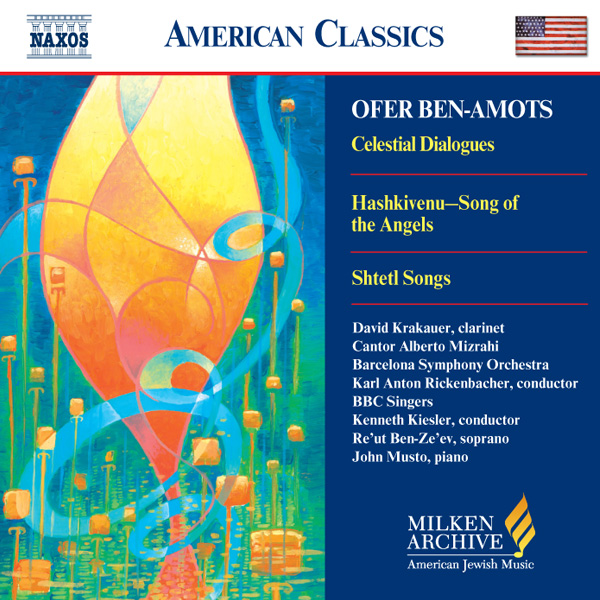Tracks
Liner Notes
T’hillim, the biblical Book of Psalms, is arguably the most “musical” book among the Holy Scriptures. Unlike the other books of the canon, T’hillim is not divided into p’rakim, or chapters, but rather into mizmorim—liturgical songs. In fact, the word psalm stems from the Septuagint’s translation of the Greek, psalmoi, referring to “songs sung to [the accompaniment of] plucked string instruments.” The Book of Psalms, comprising 150 individual texts, provides us with the largest body of original Hebraic liturgy. Moreover, from the principal content of a number of Psalms, and from their superscriptions, we learn something of musical performance practice in Jewish antiquity, and we are given indications of the variety of instruments during the First and Second Temple eras.
The text structure of the Psalms repeatedly reveals the literary technique of parallelism, which has a direct bearing on our knowledge of musical forms and vocal performance practices. Thus, a verse is often divisible into two subsections, each representing the same basic idea but with different words and even different poetic feet. Psalm 81 is an unambiguous example of such poetic parallelism. The phrase “Sing aloud unto God, our strength” has its parallel in the succeeding one: “Raise a shout for Jacob’s God.” Similarly, the phrase “For it is a law of Israel” is matched by the words “a ruling of Jacob’s God.” Similarly, the phrase “For it is a law of Israel” is matched by the words “a ruling of Jacob’s God.” In Psalm 81 we also find another form of verse partition, a technique that may be described as “supplementary parallelism.” In such cases, the second subsection of the verse goes beyond merely repeating the meaning of the first with similar but different wording, and it adds a new element, twist, or bit of new information to the initial statement. The obvious and simple process of expressing that parallelism musically involved either dividing the chorus into two groups (antiphony), or dividing the rendition of verses or subsections between soloist and chorus (responsorial rendition). Indeed, these “call and response” forms are among the earliest patterns to enter the early Church liturgy—in the Gradual, psalmody, and hymnody. The responsorial technique has remained an integral part of Hebrew liturgy and liturgical rendition in the interplay between precentor (sh’liaḥ tzibbur, or messenger of the congregation), or, later, hazzan, and congregation.
Psalm 81 is attributed to Asaf, the director of the choirs in the ancient Temple in Jerusalem. Inspired by the architecture of the text, the composition is structured as a large A-B-C-B-A “return” form. When I first examined Psalm 81, the very prospect of setting to music an original biblical Hebrew text intrigued me. My plan was to create a blend of excitement and mystery through a highly rhythmic treatment, with constantly shifting meters at a high rate of speed. This setting accentuates the unusual, irregular rhythm of ancient Hebrew, with poetic meters of 9, 11, 13, 15, etc. Second, I was interested in the parallelism of the text and its natural impact on musical form. Therefore, I chose to divide the choir into two parts and compose the Psalm setting as an antiphon. The frequent reference to musical instruments in the Psalm (drum, stringed instruments, shofar) was another inspiring element that triggered my imitation of the shofar call in the divided choir—a motive that can be heard clearly at the end of section A. In addition, I added timpani and a large batterie of other percussion to accompany the choir.
I found the concluding part of verse 6 the most intriguing: “When He went out through the land of Egypt, language I heard that I knew not.” The implication of the Hebrew word sh’ma (listen) in this context is twofold: perceiving sound, a musical function; and understanding, or realizing. The mystical and apocalyptic facets of a sudden revelation or enlightenment expressed in these words became the central part of the work—a slow fugato, marked “adagio.”
Lyrics
Sung in Hebrew
Sing joyously to God, our strength; raise a shout for the God of Jacob. Take up the song, sound the tof, the melodious kinor and navel. Blow the horn on the new moon, on the full moon for our feast day. For it is a law for Israel, a ruling of the God of Jacob; He imposed it as a decree upon Joseph when he went forth from the land of Egypt; I heard a language that I knew not.
Credits
Composer: Ofer Ben-AmotsPerformers: Petr Hladik, Percussion; Rostislav Mikeška, Percussion; Permonik Children's Choir, Eva Šeinerová, conductor; Radka Petrá¡sková¡, Vocal Soloist
Publisher: The Composer's Own Press
Translation: JPS Tanakh 1999

